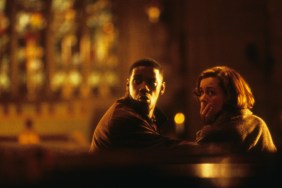
Ang Lee’s Taking Woodstock goes down easy from start to finish with only a hiccup or two along the way, but nothing that disturbs the vibe this flashback to the ’60s offers without dwelling in the era as much as telling the story of an intriguing small town family and the coming-of-age of their young son.
Demetri Martin stars as Eliot, a young interior designer working in Greenwich Village who returns home to help his parents (Henry Goodman and Imelda Staunton) with the family business – a Catskills motel going by the name of the El Monaco – marketed as a resort where towels cost a dollar extra. Eliot faces the option of watching his parents run the business into the ground and getting on with his life or sticking around and helping out. Being the good son, he sticks it out, but he doesn’t do so without inadvertently playing a major role in bringing the Woodstock Music and Arts Festival to his neighbor’s farm in White Lake, New York.
A half-million concert goers descend upon White Lake, the National Guard is called in and Eliot’s family business is booming, but amongst the mayhem Ang Lee manages to tell a very personal story. Only once does he have Eliot test the hallucinogenic waters and not a frame of this film features a single Woodstock performance, but that doesn’t stop the film from expressing the inspiration of free love, free music and the three days of history no one would have ever predicted, certainly not Eliot. But the size of it all is hardly the issue here as much as is the effect it has on Eliot and his family, and the story moves along with only a couple of mild disturbances.
A money issue addressed later in the feature serves as my major complaint. I know we are talking about a film based on a true story, but it felt like it was forced into the story being told and really slowed down the film’s momentum by coming virtually out of nowhere. While it would have been a fitting side-story to cover in a more heavy-handed feature, here it is a diversion that seemed rushed and unnecessary, even though it does add additional weight to the film’s climax. But I still contend it could have been abandoned outright.
Beyond that, Dan Fogler leading a barn-dwelling comedy troupe that prefers to perform in the nude (all except Fogler of course) is hardly amusing, but it fits with the tone of the film and isn’t in any way offensive or overly time-consuming.
However, there is far more to like than there is anything to dislike. As Eliot, Martin is as approachable as they come as he finds his way and a voice in the world. His parents are equally enjoyable, and while I think most audiences will all take to Henry Goodman as Eliot’s father, I feel there will be something of a mixed reaction to Staunton’s performance, which is hit-and-miss along the way, but she was tackling a lot and ultimately comes out on top.
The real joy with this film, though, is Liev Schreiber as Vilma, a cross-dressing ex-Marine. His outfit is a blonde wig, dress and a pair of high heels. He plays the role straight and it works at all turns. I loved every second of his time on screen with Schreiber’s performance elevating each scene and every character he comes into contact with. Standing at 6’3″ and sporting the bulk he gained for his villainous role in X-Men Origins: Wolverine, Vilma becomes the head of El Monaco security in a role to remember.
My personal interest in Woodstock as a musical event is pretty much zero, but I think we all know personal preferences — in music especially — mean nothing when a film is done right. As a matter of fact, films can turn you around completely on any kind of music you may have traditionally not enjoyed. While Taking Woodstock didn’t do that for me, it also didn’t try. The focus here wasn’t music, and the festival that brought it to Eliot’s doorstep was simply the talking point to tell a sweet coming-of-age story and it works. While Taking Woodstock isn’t grand in an sense, it is perfectly mild and easy to enjoy.










